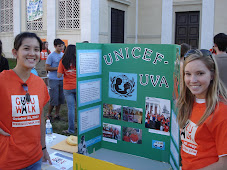KHARTOUM, Sudan (AP) -- A surge of truck hijackings threatens to cut off food rations for more than 2 million people in Darfur, the World Food Program said Wednesday, after 22 of its vehicles were attacked and stolen this month alone. 
African Union peacekeeping soldiers guard an area near al-Salam camp in North Darfur, pictured in September 2007.
With 18 drivers still missing, the U.N. agency said its main contracting companies refuse to send more food convoys into Darfur.
"If the situation continues, we'll be forced to cut rations in parts of Darfur by mid-February," Kenro Oshidari, the head of WFP operations in Sudan, said in a statement.
The increase in violence comes barely three weeks after the United Nations took over peacekeeping in the remote region of western Sudan where 2.5 million people have been chased into refugee camps by five years of war.
Five separate attacks targeted aid workers throughout Darfur just on Tuesday, officials said. Among those were ambushes of two WFP convoys in West Darfur and the detention of five WFP staff when their cars were stolen near the North Darfur state capital of El Fasher.
"They've now been released, but it was pretty traumatic," said Emilia Casella, the WFP spokeswoman in Sudan.
A vehicle from the United Nations security services was also attacked near the West Darfur capital of El Geneina, while an aid group's car was attacked inside the capital, which is under Khartoum government control.
The agency said it didn't know who was behind the latest attacks, which it blamed on "bandits."
Top U.N. aid officials met with the Sudanese government Wednesday to extend by a year the agreement that allows international aid groups to work in Sudan, but the meeting didn't address the increased hijackings.
Over the past year, WFP has been feeding between 2 million and 3.2 million people in Darfur. It plans to distribute some $500 million worth of food in the region during 2008.
The food convoys to Darfur form the world's longest humanitarian route, with nearly 1,864 miles (3,000 km) to cross between the nearest port on the Red Sea to the desert town of El Geneina, near the border with Chad.
Nearly twice as many WFP trucks have been hijacked this month than in the previous four months combined, and the U.N. said seven humanitarian vehicles have also been stolen so far.
Some 369 tons of food were looted in the latest attacks, and the lack of trucks means deliveries will be cut by half.
"Without these deliveries, WFP faces a rapid depletion of stocks" and could face a shortage by the time seasonal rains block most roads in May, Oshidari said.
The escalation came as the U.N. launched a new peacekeeping mission to try to quell the chaos in Darfur, where more than 200,000 people have died since early 2003, when ethnic African groups rebelled against the Arab-dominated central government and accused it of discrimination.
Khartoum denies accusations of widespread atrocities against civilians.
The U.N. mission had a supply convoy attacked by the Sudanese army days after taking over from the previous African Union force on January 1. The new mission is meant to grow to 26,000 peacekeepers and police officers, but less than half have reached Darfur.
"We are still lacking the aircraft, equipment and troops that are crucial for us to be present everywhere in Darfur and improve the situation," said Noureddine Mezni, the spokesman for the U.N. mission, known as UNAMID.
Sudan's government opposed for months a U.N. deployment before agreeing last June to a "hybrid operation" jointly run by the world body and the African Union. But Khartoum has since vetoed troops from some European and non-Muslim Asian countries, and U.N. officials say a series of bureaucratic hurdles could impede the deployment of an effective force.
The peacekeepers also lack some heavy military equipment such as attack helicopters.
The previous AU mission was viewed as having largely failed because it was understaffed and under-equipped.
Jean-Marie Guehenno, the chief of U.N. peacekeeping operations, is touring Darfur to assess the mission's needs. Mezni said UNAMID's leadership was appealing for U.N. members states to offer the equipment and troops "vital for the mission to succeed."
http://www.cnn.com/2008/WORLD/africa/01/23/darfur.hijackings.ap/index.html#cnnSTCText

